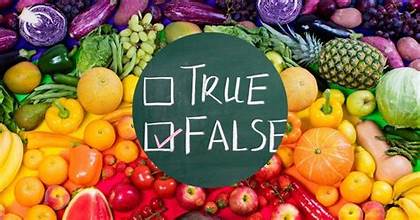Introduction
Navigating the world of nutrition can feel like wandering through a maze filled with conflicting advice and ever-changing trends. With so much information circulating, it’s easy to get caught up in common misconceptions that can throw your eating habits off balance. As we step into 2025, it’s time to shine a light on these myths and reveal what science really says about our food choices. Are carbs truly the enemy? Is fat always your foe? And should you avoid gluten at all costs? Let’s dive deep into these questions and more, busting those persistent nutrition myths while empowering you to make informed decisions for better health.
What are Nutrition Myths?
Nutrition myths are widely held beliefs about food and health that often lack scientific backing. These misconceptions can stem from cultural traditions, anecdotal experiences, or even sensational media stories.
People frequently hear statements like “carbs are the enemy” or “fat will ruin your diet.” Such claims create confusion and can lead to unhealthy eating habits.
Many individuals cling to these ideas without questioning their validity. This blind acceptance can have serious implications for overall health and well-being.
Understanding what truly constitutes good nutrition is vital in a world overflowing with information—and misinformation—about diets and lifestyle choices. It’s essential to sift through the noise to determine what science actually says about our dietary needs.
The Harmful Effects of Believing in Nutrition Myths
Believing in nutrition myths can lead to misguided choices. When people cling to these misconceptions, they often adopt extreme diets that lack essential nutrients.
For instance, avoiding all carbs might seem like a quick fix for weight loss. However, this can deprive the body of necessary energy and fiber. The result? Fatigue and digestive issues.
Similarly, demonizing fats can cause some individuals to miss out on healthy sources like avocados and nuts. These foods are crucial for brain health and hormonal balance.
Moreover, an obsession with meal timing—like fearing late-night snacks—can create anxiety around eating rather than fostering a healthy relationship with food. This stress may contribute to unhealthy eating patterns over time.
Falling for these myths not only impacts physical health but also mental well-being. It’s vital to approach nutrition with evidence-based understanding instead of outdated beliefs.
Myth #1: Carbs make you gain weight
Many people believe that carbs are the enemy when it comes to weight gain. This misconception often leads individuals to cut them out completely from their diets.
However, carbohydrates are not inherently fattening. They are a primary energy source for our bodies and play vital roles in various bodily functions.
The real issue lies in portion sizes and the quality of carbs consumed. Whole grains, fruits, and vegetables provide essential nutrients and fiber that can aid digestion and keep you feeling full longer.
On the other hand, refined carbohydrates found in sugary snacks or white bread can lead to overeating due to lack of satiety. It’s about balance rather than elimination.
By understanding how different types of carbohydrates impact your body, you can make informed dietary choices instead of succumbing to misconceptions surrounding nutrition myths related to carbs.
Myth #2: Fat is always bad for you
For years, the notion that fat is inherently bad has permeated our diets. Many have shunned it completely, fearing weight gain and health issues. However, this blanket statement overlooks essential facts.
Not all fats are created equal. Healthy fats, like those found in avocados and nuts, play crucial roles in our bodies. They support cell function and help absorb vitamins A, D, E, and K.
Recent research highlights the benefits of incorporating healthy fats into meals. These fats can improve heart health by raising good cholesterol levels while lowering the bad ones.
Additionally, they promote satiety—keeping you full longer—which may actually aid in weight management rather than hinder it. Embracing moderate amounts of healthy fat might be key to a balanced diet instead of demonizing an entire food group based on outdated beliefs.
Myth #3: Avoiding gluten is healthier
Many people believe that avoiding gluten automatically leads to a healthier lifestyle. This misconception often stems from the rise of gluten-free diets in recent years.
However, for those without celiac disease or gluten sensitivity, eliminating gluten may not provide any health benefits. In fact, many gluten-containing foods are rich in essential nutrients like fiber and B vitamins.
Opting for gluten-free products can sometimes lead individuals to consume more processed foods high in sugar and fat. These alternatives might lack nutritional value while giving an illusion of being healthier.
It’s crucial to focus on whole, nutrient-dense foods instead of simply removing one ingredient from your diet. A balanced approach is key to achieving overall wellness rather than adhering strictly to fads fueled by misconceptions about nutrition.
Myth #4: Eating late at night leads to weight gain
The belief that eating late at night leads to weight gain is a common misconception. Many people associate nighttime snacking with unwanted pounds, but the science tells a different story.
What truly matters is your overall caloric intake throughout the day. If you consume more calories than you burn, weight gain can occur regardless of when those calories are consumed.
Several studies suggest that meal timing has less influence on weight than we think. The body processes food similarly, whether it’s eaten in the morning or late at night.
People often snack mindlessly while watching TV or browsing their phones after dark. This distraction can lead to overeating rather than any inherent danger of nighttime meals themselves.
So, if you’re hungry after dinner, listen to your body and make mindful choices instead of worrying about the clock. Eating healthy snacks at night doesn’t automatically translate to packing on extra pounds.
Busting the Myths with Scientific Evidence
Understanding nutrition requires sifting through a sea of information. Science provides clarity amidst confusion, debunking those age-old myths about eating that have permeated our culture.
First, let’s address the myth that carbs lead to weight gain. Research shows that carbohydrates are an essential part of a balanced diet. They provide energy and support bodily functions. It’s not just about carb intake; it’s crucial to consider overall calorie consumption and food quality.
Next up is fat—often demonized for far too long. Certain fats, like those found in avocados or nuts, can be beneficial for heart health. Studies indicate that incorporating healthy fats into your meals can actually aid in weight management rather than hinder it.
The gluten debate has also seen its share of misconceptions. While individuals with celiac disease must avoid gluten, most people do not need to eliminate it from their diets entirely. Whole grains containing gluten can be rich sources of fiber and nutrients.
Eating late at night is another topic shrouded in misunderstanding. Recent studies suggest that what matters more than timing is total daily calorie intake and dietary choices throughout the day rather than simply when you eat.
By relying on scientific evidence rather than popular opinion or trends, we can make informed decisions about our diets free from the shackles of nutrition myths. It’s time to embrace facts over fiction when it comes to understanding what keeps us healthy and nourished.




